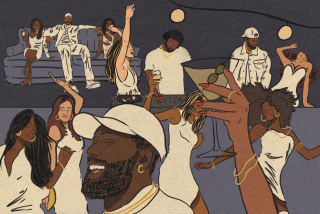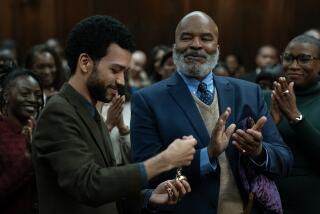Das Racist asks you to ‘Relax’ while it makes you uncomfortable
Making it big is perhaps the oldest lyrical trope in hip-hop, and there are many different ways to go about it. One could take the Jay-Z route and, through hit-making skill and business savvy, rise to the top of the old-guard music establishment. Another is to bypass that establishment entirely, hustling mix tapes and carving out your own regional or genre niche that can become self-sustaining.
Or you could do what the Brooklyn trio Das Racist did, which is to write scabrously hilarious songs that make the music and media elite feel very, very bad about itself.
“I’ve referred to Das Racist as a project to turn white guilt into money,” the group’s co-frontman Himanshu Suri said. He’s kidding. Mostly. Maybe.
For Das Racist, humor is often a means of deploying its big questions about race, class and identity via giddy, dumb-as-a-sack-of-doorknobs party hooks. In a band composed of two South Asians and an Afro-Cuban/Italian MC, they’re posing very different questions than the ones the genre has asked for years. Early songs like the absurdist ode to fast-food brand synergy “Combination Pizza Hut and Taco Bell” and the self-aware “hahahaha jk?” took them from rap blog spitball-hockers to the cover of Spin magazine, a New Yorker spread and collaborations with Diplo, who’s produced for M.I.A. and Chris Brown.
They play the Roxy Thursday in support of their September release “Relax,” their first full-length album you can pay for. At their shambolic live shows, they punctuate their banter with a sampled voice saying “W-W-W-White demons,” a joke that actually goes over great in audiences full of said demons. The band is navigating what happens when Anglo America (particularly its erstwhile-liberal fans) lines up for post-colonial barbs.
Das Racist’s career began in the way that many rap groups’ have — young men of color growing up unsure of their place in America. But their story is also that of second-generation and mixed-race kids living out their parents’ American dream. Suri, a first-generation Indian American, grew up in Queens and went to the lauded Stuyvesant High in New York; he met Das Racist collaborator Victor Vazquez when they were dorm mates at Wesleyan University. They bonded over hip-hop and their similar sense of humor over their own cultural ‘other’-ness.
After graduating, Vazquez, a Bay Area native, played in the New York electropop band Boy Crisis. Suri took a job he’s described as a “corporate headhunter” for a Connecticut firm where he would poach traders dealing in oil, gas and power markets in developing nations.
Surrounded by rapacious Wall Street peers, Suri honed his knack for needling America’s first world privilege in brutally hilarious raps.
“I live in a world of dualities, and you have to figure that out to be a stable person,” Suri said. “That push and pull is something I’m constantly thinking about.”
That duality makes Das Racist’s music work. Over two well-received formal mix tapes, “Shut Up, Dude” and “Sit Down, Man,” alongside “Relax,” the trio (now with a hype man and design collaborator Ashok “Dapwell” Kondabolu) sports a sharp vocal style that gives weight to their wisecracking. “Relax’s” first single, “ Michael Jackson,” has a nonsensical yet sticky chorus — “Michael Jackson, a million dollars / You feel me? Holla.” It’s built on a diced-up South Asian flute sample, and Suri’s raspy growl complements Vazquez’s more nimble, free-associative rhymes.
Its video simultaneously explodes the earnestness of Jackson’s “Black or White” video. Explicit boasts about the group being “… great at rapping” are blatant enough for knowing smirks, yet also kind of genuinely validating. But Das Racist also makes fun of its own appeal on tunes like “Sit Down, Man,” where Vazquez raps, “White people, play this for your black friends / Black people, smack them.”
“Booty In The Air” (also on “Relax”) is an evisceration and celebration of every clubby stripper ode on pop radio. A line like “her booty’s in the air like her booty was a cloud” could be totally within bounds on Power 106, but it’s just obvious and ridiculous enough to double as commentary on being obvious and ridiculous. They can hold their own against edgy veterans like Freddie Gibbs on “Power” but cull a lot of their production work from New York indie peers such as Patrick Wimberly from Chairlift, who produced “Michael Jackson” and “Booty” and executive-produced the whole of “Relax.”
“Yes, they’re rappers, but they’re not just making rap music,” Wimberly said. “It’s OK for you to love Beyoncé and Ariel Pink simultaneously. It’s OK for you to love Das Racist and Justin Timberlake. My hope has always been to carve new places for artists like us in pop music.”
That reputation, however, has put Das Racist in an interesting position similar to that of hip-hop peers Odd Future and ASAP Rocky. Though they play off of racial divides and cultural friction, their fan base has a large white indie-fan contingent.
With its poppier ambitions, “Relax” might work as a way reach out to a broad audience with a wider swath of color — it joined Lil Wayne, Jay-Z and Kanye West near the top of the iTunes hip-hop download charts upon its release.
But in a recent Spin cover story on the band, penned by Dapwell’s brother, the comedian Hari Kondabolu, Suri voiced concern that his audience might never quite diversify. With “Relax,” Das Racist could attract a more mainstream rap audience, or cement its reputation as a skilled satirist for the Pitchfork crowd.
The group does have more control over its destiny than most artists, though. Das Racist released “Relax” on its own Greedhead imprint, handles most band business in house and maintains a busy Web presences, including scathing blogs, op-eds on the short-lived sitcom “Outsourced” and panning critic Sasha Frere-Jones for a piece he wrote on race in indie rock.
But its best asset may be its uncanny ability to make party songs about lightning-rod topics.
“People think that [humor] is mutually exclusive with seriousness,” Suri said. “But we’re trying to create a reaction and operate in that uncomfortable space.”
More to Read
The biggest entertainment stories
Get our big stories about Hollywood, film, television, music, arts, culture and more right in your inbox as soon as they publish.
You may occasionally receive promotional content from the Los Angeles Times.







